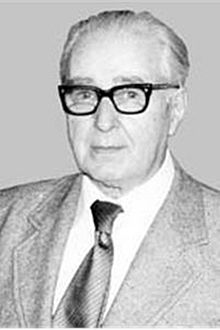Georges Gurvitch
Georges Gurvitch (born November 2, 1894 in Novorossiysk , † December 12, 1965 in Paris ) was a Russian-French sociologist.
Life
After studying philosophy at the Universities of St. Petersburg , Heidelberg and Paris , he became a lecturer at the University of St. Petersburg and took part in the Russian October Revolution . When he came into conflict with the Bolsheviks , he left the Soviet Union and first moved to Prague, where he was given a teaching position at the university, and then to France. He received French citizenship in 1929. From 1927 to 1929 he had a teaching position on tendencies in German philosophy at the Sorbonne. After his habilitation in 1932, he became an adjunct professor at the University of Bordeaux in 1934 and, a year later, successor to Maurice Halbwachs at the sociology chair at the University of Strasbourg . During World War II he emigrated to the United States , where he was visiting professor at the New School for Social Research . After the end of the war he taught again in Strasbourg and in 1948 was appointed to the chair of sociology at the Sorbonne. In 1950 he also became director of research at the École pratique des hautes études . In the 1950s he was one of the leading representatives of his subject in France.
Gurvitch's understanding of sociology
After his return to France at the end of 1945, Gurvitch participated together with Georges Friedmann , Gabriel Le Bras , Jean Stœtzel and others in the rebuilding of French sociology, which had been dominated by Durkheimians until the World War II. Gurvitch is also based on the sociology of Émile Durkheim , but founded a school that set itself apart from him.
In La vocation actuelle de la sociologie (1950) he defined the programmatic foundations of a “differential sociology”. As a science of the “total social phenomena”, it encompasses graduated levels of social reality in the macrosociological area. In the microsociological area, it captures the manifestations of sociability or association. In Déterminismes sociaux et liberté humaine (1955) Gurvitch reflects for the first time systematically on the question of time. It is about overcoming the sham debates, a legacy of the philosophers and the pioneers of the social sciences, i.e. the opposites of individual vs. Society, freedom vs. Need for qualitative time vs. quantitative time. According to Gurvitch, social reality is always diverse and in actu. Sociology must defend itself against reductionist modes of explanation.
Two translations of his French-language work into German appeared in the Sociological Texts series :
- Eléments de sociologie juridique , as Volume 6: Fundamentals of the Sociology of Law . Authorized German edition with an international bibliography of legal sociology by Paul Trappe . Translated by Hans Naumann and Sigrid von Massenbach, Luchterhand, Neuwied 1960 (second edition: Luchterhand, Darmstadt / Neuwied 1974, ISBN 978-3-472-72506-0 ).
- Dialectique et sociologie , as Volume 23: Dialectics and Sociology . Translated and with an afterword by Lutz Geldsetzer, Luchterhand, Neuwied / Berlin 1965.
Web links
- Entry: Gurvitch, Georges . Encyclopedia.com, accessed August 14, 2020.
Individual evidence
- ↑ Unless otherwise stated, biographical information is based on: Hans Leo Krämer and Heinz Maus , Gurvitch, Georges . In: Wilhelm Bernsdorf , Horst Knospe (Ed.): Internationales Soziologenlexikon. Volume 1: Articles on sociologists who died by the end of 1969. 2nd revised edition. Enke, Stuttgart 1980, ISBN 3-432-82652-4 , p. 161 f.
- ↑ a b c Alain Maillard, The Times of the Historian and the Times of the Sociologist. The argument between Braudel and Gurvitch - looked at again . In: Trivium (Online), 9/2011, November 30, 2011, accessed on August 15, 2020.
- ↑ Pierre Bourdieu : A sociological self-experiment . Translated by Stephan Egger, Suhrkamp, Frankfurt 2002, ISBN 3-518-12311-4 , p. 38 f.
- ↑ Hans Leo Krämer and Heinz Maus , Gurvitch, Georges . In: Wilhelm Bernsdorf , Horst Knospe (Ed.): Internationales Soziologenlexikon. Volume 1: Articles on sociologists who died by the end of 1969. 2nd revised edition. Enke, Stuttgart 1980, ISBN 3-432-82652-4 , p. 161 f.
| personal data | |
|---|---|
| SURNAME | Gurvitch, Georges |
| BRIEF DESCRIPTION | Russian-French sociologist |
| DATE OF BIRTH | November 2, 1894 |
| PLACE OF BIRTH | Novorossiysk |
| DATE OF DEATH | December 12, 1965 |
| Place of death | Paris |
